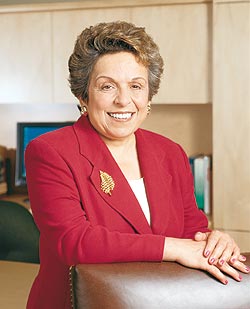
Shalala, the former head of Medicare, is convinced that seniors are responding to warnings that reforms will reduce their services. ``These are recipients of a `public plan' and they're concerned that another `public plan' will ruin the country.'' In fact, like Tommy Thompson, another former head of HHS, Shalala is concerned that Medicare will run into financial trouble, even without reform. ``Because of the baby boomers'' approaching Medicare age, ``there's a big hump coming up . . . ``Can we do that without new money? No.'' But smarter spending -- such as not doing unnecessary tests and procedures -- and reduction of fraud can keep additional costs to a minimum. Even so, ``there is nothing in the bill about reducing their benefits.'' University of Miami President and former Clinton Cabinet member Donna Shalala served as a Peace Corps Volunteer in Iran in the 1960's.
Donna Shalala says 1993 healthcare mistakes won't be repeated
Shalala: '93 healthcare mistakes won't be repeated
UM President Donna Shalala, a veteran of the failed healthcare reform effort in the Clinton administration, sees hope this time around.
BY JOHN DORSCHNER
jdorschner@MiamiHerald.com
As Congress returns from vacation to restart the heated healthcare debate, one battle-scarred veteran of the reform wars, Donna Shalala, remains optimistic that far-reaching changes are still possible.
``I still think we're going to get it done,'' said Shalala, the University of Miami president who was secretary of Health and Human Services during the Clinton era, when an ambitious healthcare proposal collapsed -- a dismal failure that still haunts present-day reform efforts.
In a far-ranging interview, she said she believes there's a ``total difference'' between now and 1993, when ``it was all driven by the White House, with very little participation from Congress.'' The Clinton proposal was crafted in a ``pretty secret, tightly held process.'' Left outside, leaders of Congress and the healthcare industry quickly rejected the Clinton plan.
Thanks to ``some lessons learned and some lessons over-interpreted,'' the Obama administration's moves have been ``very transparent,'' with Democrat leaders searching for consensus and industry support. ``They're still looking for where the consensus is.''
Some critics complain that President Barack Obama has gone too far the other way, not being enough of a force in telling Congress how to shape a plan. Shalala disagrees. ``I think he's played a pretty strong role. First, he defined what the general objectives should be. Second, the administration has been supplying the data and the analysis'' that Congress is using in its discussions.
PUBLIC OUTRAGE
She has two thoughts about some recent shouting matches at town halls. One: Much of the anger bubbling up about healthcare reform is really that ``people are generally unhappy with the economic downturn.'' Two: The outbursts are minor diversions. ``The discussion is not really inflamed. Hundreds of these forums have gone on without being disrupted. It's only sometimes, when the cameras are on'' that things happen.
Polls show a fairly even split. At the end of July, Gallup reported 44 percent of Americans thought reforms would improve medical care in the U.S., while 34 percent thought it would worsen and 14 percent believed it would make no change.
The group with growing concerns is the elderly. A Gallup Poll in July showed 42 percent of those over 65 believe reform will ``worsen medical care in the United States.''
Shalala, the former head of Medicare, is convinced that seniors are responding to warnings that reforms will reduce their services. ``These are recipients of a `public plan' and they're concerned that another `public plan' will ruin the country.''
In fact, like Tommy Thompson, another former head of HHS, Shalala is concerned that Medicare will run into financial trouble, even without reform. ``Because of the baby boomers'' approaching Medicare age, ``there's a big hump coming up . . .
``Can we do that without new money? No.'' But smarter spending -- such as not doing unnecessary tests and procedures -- and reduction of fraud can keep additional costs to a minimum. Even so, ``there is nothing in the bill about reducing their benefits.''
IN THE HOUSE BILL
Shalala says she has read the 1,000-page House bill. Some critics claim its very length -- going into detail about such issues as end-of-life counseling -- is a problem because each detail attracts opponents.
She disagrees. ``The reason it's a thousand pages is you have to amend existing laws to do the four or five things they're trying to do.'' That kind of legislative detail gets complex. ``You can summarize it in five pages, and they've done so.''
Like the Republican Thompson, she supports the concept of an ``individual mandate,'' requiring everyone to have health insurance, and if they can't afford it, then they could get help from government subsidies.
She believes fears of the so-called ``public plan'' are exaggerated. ``First of all, we already have three public plans. SCHIP [for children], Medicaid [for the poor] and Medicare. And people are generally happy with them.'' A new public plan would not be for everybody, but an alternative to those seeking insurance on the individual market -- a segment that now includes about 5 percent of Americans.
Critics say a public plan would lead to the eventual death of private insurance because it would be cheaper. ``But I have great faith in the country's insurance companies.'' They are experts at carefully designing plans to meet all sorts of individual needs, and Shalala believes they can continue to do so.
Still, if Obama decides he needs to drop a public option to get congressional support, she would understand.
She points out that, though the Obama administration is pushing hard to get a reform package approved quickly, ``most of the changes don't take place until 2011. So we have many ways of fine-tuning'' the details before then. ``People who do the details are going to find the center,'' where a consensus can occur.












